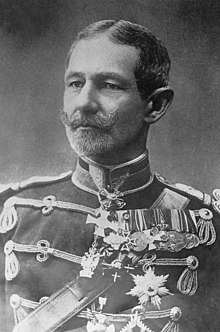
Back أليكسندرو أفيريسكو Arabic اليكسندرو افيريسكو ARZ Aleksandru Averesku AZ Аляксандру Авэрэску BE-X-OLD Александру Авереску Bulgarian Alexandru Averescu Catalan Alexandru Averescu Czech Alexandru Averescu German Αλεξάντρου Αβερέσκου Greek Alexandru Averescu Spanish
Alexandru Averescu | |
|---|---|
 General Alexandru Averescu, photographed ca. 1916 | |
| 24th Prime Minister of Romania | |
| In office 29 January 1918 – 4 March 1918 | |
| Monarch | Ferdinand I |
| Preceded by | Ion I. C. Brătianu |
| Succeeded by | Alexandru Marghiloman |
| In office 13 March 1920 – 16 December 1921 | |
| Monarch | Ferdinand I |
| Preceded by | Alexandru Vaida-Voevod |
| Succeeded by | Take Ionescu |
| In office 30 March 1926 – 4 June 1927 | |
| Monarch | Ferdinand I |
| Preceded by | Ion I. C. Brătianu |
| Succeeded by | Barbu Știrbey |
| Foreign Affairs Minister of Romania | |
| In office 29 January 1918 – 4 March 1918 | |
| Prime Minister | Himself |
| Preceded by | Ion I. C. Brătianu |
| Succeeded by | Constantin C. Arion |
| Chief of the Romanian General Staff | |
| In office 18 November 1911 – 2 December 1913 | |
| Monarch | Carol I |
| Preceded by | Vasile Zottu |
| Succeeded by | Constantin Cristescu |
| Member of the Crown Council | |
| In office 30 March 1938 – 2 October 1938 | |
| Monarch | Carol II |
| President of the People's Party | |
| In office 3 April 1918 – March 1938 | |
| Succeeded by | Petre P. Negulescu |
| Personal details | |
| Born | March 9, 1859 Babele, United Principalities (today Ozerne, Ukraine) |
| Died | October 2, 1938 (aged 79) Bucharest, Kingdom of Romania |
| Political party | People's Party |
| Spouse | Clotilda Averescu |
| Profession | Officer |
| Military service | |
| Allegiance | |
| Branch/service | Romanian Land Forces |
| Rank | |
| Commands | First Infantry Division Second Army Corps Second Army Third Army |
| Battles/wars | |
Alexandru Averescu (Romanian pronunciation: [alekˈsandru aveˈresku] ; 9 March 1859 – 2 October 1938) was a Romanian marshal, diplomat and populist politician. A Romanian Armed Forces Commander during World War I, he served as Prime Minister of three separate cabinets (as well as being interim Foreign Minister in January–March 1918 and Minister without portfolio in 1938). He first rose to prominence during the peasants' revolt of 1907, which he helped repress with violence. Credited with engineering the defense of Moldavia in the 1916–1917 Campaign, he built on his popularity to found and lead the successful People's Party, which he brought to power in 1920–1921, with backing from King Ferdinand I and the National Liberal Party (PNL), and with the notable participation of Constantin Argetoianu and Take Ionescu.
His controversial first mandate, marked by a political crisis and oscillating support from the PNL's leader Ion I. C. Brătianu, played a part in legislating land reform and repressed communist activities, before being brought down by the rally of opposition forces. His second term of 1926–1927 brought a much-debated treaty with Fascist Italy, and fell after Averescu gave clandestine backing to the ousted Prince Carol. Faced with the People Party's decline, Averescu closed deals with various right-wing forces and was instrumental in bringing Carol back to the throne in 1930. Relations between the two soured over the following years, and Averescu clashed with his fellow party member Octavian Goga over the king's attitudes. Shortly before his death, he and Carol reconciled, and Averescu joined the Crown Council.
Averescu, who authored over 12 works on various military topics (including his memoirs from the frontline),[1] was also an honorary member of the Romanian Academy and an Order of Michael the Brave recipient. He became a Marshal of Romania in 1930.
- ^ Petre Otu, "Mareșalul Alexandru Averescu (1859–1938)" ("Marshal Alexandru Averescu"), in Dosarele Istoriei, 2(30)/1999, p.22-23